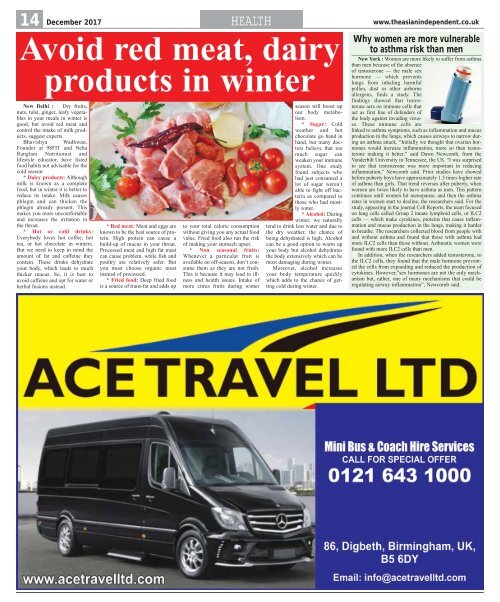December Issue
December 2017
December 2017
You also want an ePaper? Increase the reach of your titles
YUMPU automatically turns print PDFs into web optimized ePapers that Google loves.
14 <strong>December</strong> 2017<br />
HEALTH<br />
www.theasianindependent.co.uk<br />
Avoid red meat, dairy<br />
products in winter<br />
New Delhi : Dry fruits,<br />
nuts, tulsi, ginger, leafy vegetables<br />
in your meals in winter is<br />
good, but avoid red meat and<br />
control the intake of milk products,<br />
suggest experts.<br />
Bhavishya Wadhwan,<br />
Founder at 98FIT and Neha<br />
Ranglani Nutritionist and<br />
lifestyle educator, have listed<br />
food habits not advisable for the<br />
cold season:<br />
* Dairy products: Although<br />
milk is known as a complete<br />
food, but in winter it is better to<br />
reduce its intake. Milk causes<br />
phlegm and can thicken the<br />
phlegm already present. This<br />
makes you more uncomfortable<br />
and increases the irritation in<br />
the throat.<br />
* Hot or cold drinks:<br />
Everybody loves hot coffee, hot<br />
tea, or hot chocolate in winters.<br />
But we need to keep in mind the<br />
amount of fat and caffeine they<br />
contain. These drinks dehydrate<br />
your body, which leads to much<br />
thicker mucus. So, it is best to<br />
avoid caffeine and opt for water or<br />
herbal fusions instead.<br />
* Red meat: Meat and eggs are<br />
known to be the best source of protein.<br />
High protein can cause a<br />
build-up of mucus in your throat.<br />
Processed meat and high fat meat<br />
can cause problem, while fish and<br />
poultry are relatively safer. But<br />
you must choose organic meat<br />
instead of processed.<br />
* Fried food: Deep fried food<br />
is a source of trans-fat and adds up<br />
to your total calorie consumption<br />
without giving you any actual food<br />
value. Fried food also run the risk<br />
of making your stomach upset.<br />
* Non seasonal fruits:<br />
Whenever a particular fruit is<br />
available on off-season, don’t consume<br />
them as they are not fresh.<br />
This is because it may lead to illness<br />
and health issues. Intake of<br />
more citrus fruits during winter<br />
season will boost up<br />
our body metabolism.<br />
* Sugar: Cold<br />
weather and hot<br />
chocolate go hand in<br />
hand, but many doctors<br />
believe that too<br />
much sugar can<br />
weaken your immune<br />
system. One study<br />
found subjects who<br />
had just consumed a<br />
lot of sugar weren’t<br />
able to fight off bacteria<br />
as compared to<br />
those who had mostly<br />
water.<br />
* Alcohol: During<br />
winter, we naturally<br />
tend to drink less water and due to<br />
the dry weather, the chance of<br />
being dehydrated is high. Alcohol<br />
can be a good option to warm up<br />
your body but alcohol dehydrates<br />
the body extensively which can be<br />
most damaging during winter.<br />
Moreover, alcohol increases<br />
your body temperature quickly<br />
which adds to the chance of getting<br />
cold during winter.<br />
Why women are more vulnerable<br />
to asthma risk than men<br />
New York : Women are more likely to suffer from asthma<br />
than men because of the absence<br />
of testosterone — the male sex<br />
hormone — which prevents<br />
lungs from inhaling harmful<br />
pollen, dust or other airborne<br />
allergens, finds a study. The<br />
findings showed that testosterone<br />
acts on immune cells that<br />
act as first line of defenders of<br />
the body against invading viruses.<br />
These immune cells are<br />
linked to asthma symptoms, such as inflammation and mucus<br />
production in the lungs, which causes airways to narrow during<br />
an asthma attack. “Initially we thought that ovarian hormones<br />
would increase inflammation, more so than testosterone<br />
making it better,” said Dawn Newcomb, from the<br />
Vanderbilt University in Tennessee, the US. “I was surprised<br />
to see that testosterone was more important in reducing<br />
inflammation,” Newcomb said. Prior studies have showed<br />
before puberty boys have approximately 1.5 times higher rate<br />
of asthma than girls. That trend reverses after puberty, when<br />
women are twice likely to have asthma as men. This pattern<br />
continues until women hit menopause, and then the asthma<br />
rates in women start to decline, the researchers said. For the<br />
study, appearing in the journal Cell Reports, the team focused<br />
on lung cells called Group 2 innate lymphoid cells, or ILC2<br />
cells — which make cytokines, proteins that cause inflammation<br />
and mucus production in the lungs, making it harder<br />
to breathe. The researchers collected blood from people with<br />
and without asthma and found that those with asthma had<br />
more ILC2 cells than those without. Asthmatic women were<br />
found with more ILC2 cells than men.<br />
In addition, when the researchers added testosterone, to<br />
the ILC2 cells, they found that the male hormone prevented<br />
the cells from expanding and reduced the production of<br />
cytokines. However,”sex hormones are not the only mechanism<br />
but, rather, one of many mechanisms that could be<br />
regulating airway inflammation”, Newcomb said.

















